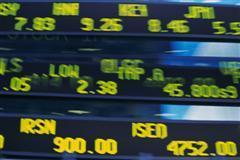| Home | About | Archives | RSS Feed |

@theMarket: Stop Worrying About Inflation
 Here is a sampling of comments I received this week from Berkshire clients:
Here is a sampling of comments I received this week from Berkshire clients:
"Just wait until higher prices start hiking the inflation rate."
"Interest rates are rising because of inflation."
"Look at the government deficit disaster, the only thing we can do is inflate our way out of debt."
It is as if everyone in the United States is absolutely convinced that we are on the verge of hyperinflation. And yet the inflation rate remains below the Federal Reserve's target of what is considered a healthy rate of inflation. It's time I cut through the hyperbole and set things straight for you and I.
I believe that until the unemployment rate drops substantially, inflation in the U.S. will be contained to no more than 2 or 3 percent.
In the meantime, in order for the housing market, the banking sector, the nation's unemployed and the economy overall to improve, we need to spend more money and ignore the deficit for now. The Fed has it right. Drown the system with dollars until even the most recalcitrant lender has no choice but to lend despite the perceived risk.
Commodity prices are rising because of 1) terrible weather and 2) economic recovery worldwide. Those price increases may or may not be inflationary depending upon where you live and do business. Additional demand for wallboard by a local builder, for example, is a good thing because there is a lot of excess capacity right now in the U.S. The same is not true for Chinese or Indian builders, who are populating their country's skylines with thousands of new buildings. For them, higher prices for every additional nail, two-by-four or steel girder fuel their already high inflation rates.
Quantitative easing has been judged a failure by a host of economists and strategists because it has caused interest rates to rise and asset prices to increase, but those are positive developments in my opinion. The price rise in assets (capital goods) is why big takeover deals are back. The impetus behind "merger mania" is simple: investors' expectations have changed drastically from last year's "double dip" mentality. Both market participants and corporations now believe that the return on investments over the coming years will be far higher than expected so assets are worth more now; thus the price increase. That's why investors are loving the increasing stream of takeovers and mergers. These asset price increases will lead to a surge in economic activity and ultimately increases in employment.
The rise in interest rates does not indicate inflation fears. They are simply reflecting the new reality that real returns on assets are increasing. In order to stay competitive, the bond market must offer higher rates. So don't be spooked by higher rates. Their increase is a natural, predictable and welcome development in any country's economic recovery. Don't let the talking heads tell you otherwise.
Expect the dollar to continue to weaken. Very few countries outside of the U.S. have any form of QE I, II. As a result, other countries' currencies will strengthen against the greenback as their interest rates rise much higher than our own. As I've written before, this is good for our exports because a cheaper dollar increases demand for "Made in America" products. Witness this week's take over of the New York Stock Exchange by the Germans.
As for the stock market, contrary to everyone's expectations of an impending correction, the averages continue to confound to the upside. I say expect a correction, but don't wait for it. We have considerable upside ahead of us. Stay the course and stay invested regardless of any pending pullbacks.
Bill Schmick is an independent investor with Berkshire Money Management. (See "About" for more information.) None of the information presented in any of these articles is intended to be and should not be construed as an endorsement of BMM or a solicitation to become a client of BMM. The reader should not assume that any strategies, or specific investments discussed are employed, bought, sold or held by BMM. Direct your inquiries to Bill at 1-888-232-6072 (toll free) or e-mail him at wschmick@fairpoint.net. Visit www.afewdollarsmore.com for more of Bill's insights.
| Tags: inflation, QE |

